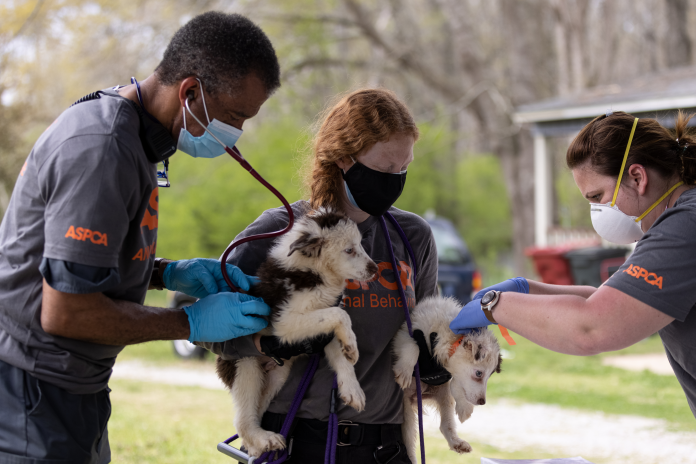HAMILTON, Ala. – At the request of the Hamilton Police Department, the American Society for the Prevention of Cruelty to Animals (ASPCA) on Wednesday assisted with the rescue of nearly 30 dogs, including puppies, from a property in Hamilton, Alabama, approximately 90 miles northwest of Birmingham. The ASPCA is providing support with evidence collection, legal assistance, forensics exams, medical and behavioral care and sheltering for the animals. The Greater Birmingham Humane Society is also assisting with this case by providing expert veterinary support and temporary sheltering for the dogs until they are relocated to an emergency shelter operated by the ASPCA at an undisclosed location.
Early Wednesday, investigators arrived on the property and discovered dogs of various breeds and ages living in filthy and overcrowded conditions, with many suffering from untreated medical issues. While many of the dogs were living in the residence and an attached garage, which was poorly ventilated and had dangerous levels of ammonia, others were found outside in cages covered in mud and feces. Deceased animal remains were also found on the property.
“Animal cruelty should not be tolerated anywhere, and the ASPCA is grateful to the Hamilton Police Department for pursuing this case and continuing to make animal welfare issues a priority in their community,” said Jasmine Holsinger, director of field Operations for the ASPCA National Field Response team. “The animals we rescued today were living in poor conditions where their basic needs were not being met, and we look forward to providing them with immediate and much-needed care.”
Animal cruelty charges are pending based on evidence collected by the Hamilton Police Department, with the assistance of ASPCA experts in support of the investigation. The ASPCA is also providing support to ensure the best legal outcome for these animals.
The ASPCA deploys nationally to assist local authorities in animal cruelty cases including animal fighting, hoarding and puppy mills. They also provide local communities with resources including grant funding, training and subject matter expertise to effectively assist animals during cruelty and disaster situations.




















